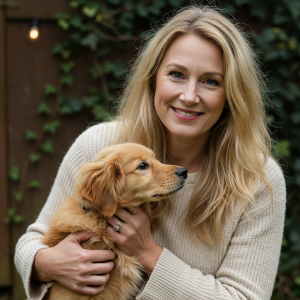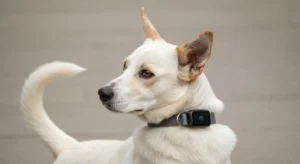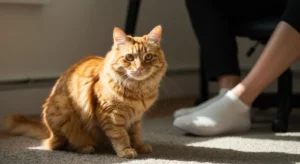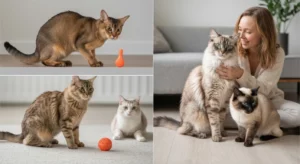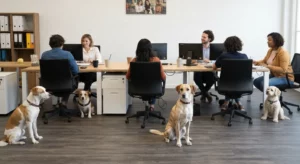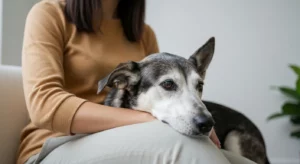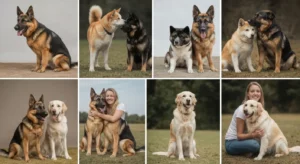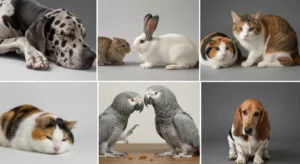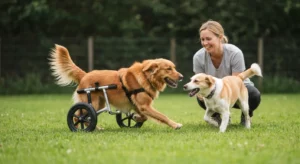Over my thirty-plus years of living with, training, and volunteering for dogs, I’ve learned one profound truth: loyalty isn’t just a trait in a dog; it’s a language. It’s spoken in the frantic tail wags when you walk through the door, the gentle head resting on your lap when you’re sad, and the unwavering gaze that says, “I’m with you.” It’s a bond forged not just by breed, but by love, respect, and countless shared moments.
People often ask me, “What are the most loyal dog breeds?” It’s a question I love because the answer isn’t just a list—it’s a collection of stories, of furry faces and unforgettable souls who have left paw prints all over my heart. This isn’t a scientific ranking. This is my journey through the world of canine devotion, a tribute to the dogs who taught me everything I know about what it means to be truly, deeply loyal. So grab a cup of coffee, and let me tell you about a few of them.
-
The German Shepherd: My First Teacher in Unwavering Devotion
My education in loyalty began with a German Shepherd named Max. He wasn’t technically my dog; he was our family’s. But from the moment I was old enough to throw a ball, he was my shadow. I remember being a clumsy kid, maybe seven or eight years old, and tripping over a tree root in the backyard. I wasn’t badly hurt, just a scraped knee and a bruised ego, but I started to cry. Before my mom could even get off the porch, Max was there, licking the tears from my face and nudging my hand with his big, wet nose. He didn’t leave my side until I was safely back inside with a bandage and a cookie.
That was Max’s job, as he saw it. He was our self-appointed guardian. He’d lie at the foot of my bed until I fell asleep and station himself by the big front window every afternoon, waiting for the school bus to drop me off. His loyalty wasn’t loud or demanding; it was a quiet, constant presence. It was the feeling of being utterly safe.
What I learned: A German Shepherd’s loyalty is often tied to their sense of purpose. They are working dogs at heart, and their “job” is their family. To earn their devotion, you have to give them a role. Include them in your life, train them consistently, and make them feel needed. In return, you’ll get a partner who would walk through fire for you.
-
The Akita: A Lesson in Fierce, One-Person Loyalty
Years later, volunteering at a local shelter, I met Kiko. He was a magnificent brindle Akita, surrendered because his family was moving and couldn’t take him. He was aloof, almost regal. He tolerated the staff and volunteers but kept a stoic distance. Most people who came looking for a dog would pass his kennel by, intimidated by his silent, powerful presence. But one of the veteran volunteers, a quiet woman named Maria, saw something else.
Every day, Maria would just sit outside his kennel and talk to him. For weeks, he ignored her. Then one day, he walked to the front of his run and laid down, facing her. Soon after, he allowed her to leash him for walks. The transformation was breathtaking. With Maria, Kiko was a different dog—gentle, attentive, and incredibly protective. He’d lean his entire massive body against her legs, a silent request for a scratch behind the ears. He had chosen his person.
What I learned: Akita loyalty is not given freely; it is earned. They are not the “love everyone” type of dog. They often bond deeply and intensely with one person or family, and their devotion is legendary. If you are their person, you are their entire world. This isn’t a breed for a casual owner; it’s for someone who understands and respects a profound, primitive bond.
-
The Golden Retriever: The Empathetic Soulmate
If an Akita’s loyalty is a fortress, a Golden Retriever’s is an open door. I experienced this firsthand with Sunny, the goofy, golden-furred goofball who saw me through my toughest college years. I brought her home as a fluffy eight-week-old puppy, and we grew up together, in a way. She was there for every late-night study session, every celebratory pizza, and every tearful phone call home.
I’ll never forget the night after a particularly brutal breakup. I came home, collapsed on the sofa, and just sobbed. I didn’t even have to call her. Sunny, who was usually chasing a squeaky toy, trotted over, placed her heavy head on my lap, and let out a deep, sympathetic sigh. She didn’t move for hours, just stayed with me, her warm presence a better comfort than any words could be. She seemed to not just sense my sadness but to absorb it.
What I learned: A Golden Retriever’s loyalty is deeply empathetic. They are tuned in to human emotions in a way that is almost psychic. They want to be in the center of the family, sharing in your joy and soothing your sorrows. Their devotion is soft, gentle, and freely given, but it thrives when they feel like a true member of the emotional core of the household.
-
The Labrador Retriever: Eager-to-Please Loyalty
People often lump Labs and Goldens together, and while they share many wonderful traits, I’ve always found their brand of loyalty to be subtly different. I helped a friend, Mark, train his chocolate Lab puppy, Buddy. Buddy was pure, unadulterated enthusiasm. His entire body wiggled with joy at the simplest things, especially if it involved Mark.
What struck me during our training sessions was Buddy’s intense desire to please. Yes, he loved the treats, but what he truly lived for was Mark’s “Good boy, Buddy!” His loyalty was expressed through action. Learning to “sit,” “stay,” or “fetch” wasn’t a chore; it was a joyful game he played to make his favorite person happy. He’d bring Mark his slippers every morning, not because he was trained to, but because he figured out it made Mark smile. It was his daily gift of devotion.
What I learned: A Labrador’s loyalty is an active partnership. They live to work with you. This makes them incredibly trainable, but it also means they need a job. Whether it’s retrieving the newspaper, competing in dock diving, or just being an active walking companion, they are happiest when they are doing something for and with their person.
-
The Great Pyrenees: The Silent, Watchful Guardian
My neighbor for years had a pair of Great Pyrenees, Ghost and Phantom. They weren’t cuddly dogs in the traditional sense. They spent most of their days patrolling the perimeter of their large, fenced-in yard. Their loyalty wasn’t about fetching a ball or snuggling on the couch; it was a solemn, deeply ingrained duty.
I remember a massive thunderstorm one night that knocked out the power to our entire street. It was pitch black and eerie. I looked out my window and saw two ghostly white shapes, Ghost and Phantom, sitting side-by-side at the highest point of their yard, silently watching over their property—and by extension, the whole neighborhood. They weren’t barking or panicking. They were on duty. They were a calming, reassuring presence in the chaos. Their family was safe inside, and that was all that mattered.
What I learned: The loyalty of a livestock guardian breed like the Great Pyrenees is independent and protective. They love their family deeply, but they show it by keeping watch. They don’t need constant direction to be devoted. If you want a velcro dog, this isn’t it. But if you want a majestic, self-thinking guardian whose loyalty is a silent promise of safety, you’ll find no better companion.
-
The Collie: The Intelligent, Intuitive Companion
Everyone thinks of Lassie, and honestly, it’s not that far off. I had the pleasure of pet-sitting a Collie named Skye for a few weeks, and it was like living with a furry mind-reader. Collies are not just loyal; they are incredibly attuned to routines, moods, and even unspoken intentions.
One afternoon, I was feeling a bit under the weather and decided to take a nap. I didn’t say anything, just headed for the bedroom. Skye, who had been dozing in the living room, got up, followed me, and gently nudged the bedroom door open wider before settling on the rug next to my bed. It was as if she knew I wasn’t feeling well and decided her place was with me. Her loyalty was anticipatory; she understood what you needed before you did.
What I learned: A Collie’s devotion is rooted in their high intelligence and sensitivity. They thrive on a deep mental connection with their owners. They need more than just physical exercise; they need to be part of the conversation, to understand the flow of the household. Their loyalty feels less like a dog following its master and more like a true partnership of minds.
-
The Doberman Pinscher: The Misunderstood Velcro Dog
Dobermans get a bad rap. Their sleek, powerful look can be intimidating. But the first Doberman I truly got to know, a stunning female named Zara, completely shattered that stereotype for me. Zara belonged to a friend, and I braced myself for a high-strung, aggressive guard dog. What I found was one of the most sensitive, loving, and physically affectionate dogs I’d ever met.
Zara’s favorite activity was the “Dobie lean.” Whenever her owner stood still for more than a few seconds, Zara would press her entire body against her legs, leaning with all her weight, a gesture of complete trust and a need for physical contact. She wasn’t a guard dog; she was a 70-pound lap dog who just wanted to be as close to her human as physically possible. Her loyalty was a constant, warm pressure against your side.
What I learned: Don’t judge a Doberman by its cover. Their loyalty is often expressed through intense physical closeness. They are true “velcro dogs” who are deeply bonded to their families and can suffer from separation anxiety if not properly socialized. They are sensitive souls in a warrior’s body, and their devotion is total.
-
The Rottweiler: The Calm, Confident Protector
In my shelter days, the dog who broke my heart the most was a big, block-headed Rottweiler named Tank. He was surrendered by a family who didn’t have time for him anymore. He was confused and sad, but never once aggressive. He was just a gentle, quiet giant waiting for someone to love. He became a volunteer favorite, known for his calm demeanor and rumbling “Rottie purr” when you scratched his chest.
Tank’s loyalty wasn’t showy. It was a quiet confidence. When he trusted you, he would simply sit at your feet, a solid, reassuring anchor. You could see in his soft brown eyes a deep well of devotion just waiting to be given to a new family. He taught me that the biggest dogs often have the gentlest hearts, and their loyalty is a calm, steady force.
What I learned: A Rottweiler’s loyalty comes from a place of quiet confidence. They are natural guardians, but their first instinct isn’t aggression; it’s watchfulness. They need a calm, confident leader they can trust. When they feel secure, they are incredibly loving, patient, and steadfastly loyal companions.
-
The Beagle: The Merry, Pack-Oriented Shadow
My grandpa had a Beagle named Copper, and that dog was a little rogue with a heart of gold. His nose was constantly getting him into trouble, leading him on grand adventures around the neighborhood. But no matter how far he roamed, he was fiercely loyal to his pack—my grandpa.
Copper was my grandpa’s shadow. From the workshop to the garden to the armchair in front of the TV, Copper was there, usually curled up at his feet. His loyalty wasn’t silent or stoic; it was a merry, vocal, tail-wagging presence. He was part of the fabric of the household, and his devotion was shown by his simple, unwavering need to be with his people.
What I learned: A Beagle’s loyalty is pack-based. You are the leader of their pack, and their single greatest desire is to be with you. They are merry, wonderful companions, but their nose can be their master. Their loyalty means they will always come back home, but it’s our job to keep them safe on their scent-driven journeys. A secure yard is a must!
-
The St. Bernard: The Gentle Giant Nanny
I once knew a family who bred St. Bernards, and I was always in awe of these gentle giants. Their most famous dog, a massive male fittingly named Barry, was the epitome of patient devotion. The family had two young toddlers, and Barry was their furry, drooly, ever-patient guardian.
I saw those kids climb on him, pull his ears (gently, of course), and use him as a pillow. Barry would just lie there, occasionally letting out a deep sigh of contentment and giving a clumsy, loving lick. He seemed to understand his immense size and strength, and his loyalty to those tiny humans was expressed through incredible gentleness and patience. He was a true “nanny dog.”
What I learned: The loyalty of a St. Bernard is nurturing and incredibly patient. They were bred to rescue and protect, and that instinct translates into a deep, gentle devotion to their family, especially children. They are loving and loyal to a fault, but be prepared for the size, the food bills, and, yes, the slobber. It’s a small price to pay for such a giant heart.
Looking back at all these dogs, from Max to Barry, I see a beautiful tapestry of devotion. While these breeds have a strong predisposition for loyalty, the truth is that any dog, from the purest purebred to the scruffiest mutt, has the capacity for an unbreakable bond. Loyalty isn’t something you buy with a pedigree. It’s something you build, day by day, with every walk, every meal, every shared moment on the couch.
It’s a promise we make to them, and one they spend their entire lives keeping for us. And that, more than any breed standard, is what will truly melt your heart.


